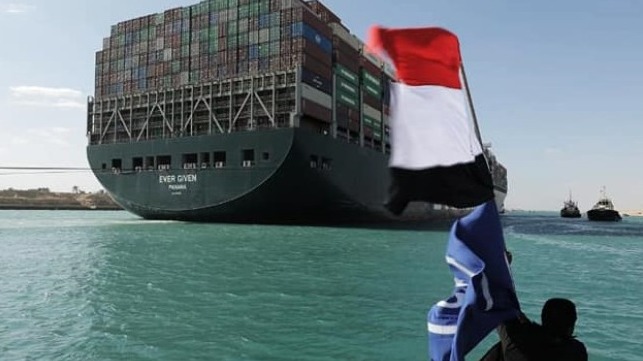Ever Given – What Happens Now

The containership Ever Given ran aground while transiting the Suez Canal on March 23, 2021, lodging herself against both banks of the waterway. The blockage caused vessels backed up in the Mediterranean to the north and the Red Sea to the south. It is estimated that the costs to global trade was about $400 million per hour based on the approximate value of goods that are moved through the Suez every day, according to shipping data and news company Lloyd’s List.
For six days, the world watched as a multi-national team of salvors, tug operators and the Suez Canal Authority (SCA) coordinated a race against time to free the ship and unclog the canal.
Detention by Suez Canal Authority
The Ever Given is now being held by the Suez Canal Authority, which demands it must be paid $916 million for salvage costs and damages. An Egyptian court has ruled that the SCA has a right to arrest the vessel until it is paid. The SCA says that sum helps cover the revenue lost during the canal blockage, the cost of the rescue mission and a fee for the damage sustained by the canal’s embankments when the ship became lodged in them.
UK P&I Club, the liability insurer of the Ever Given has filed an appeal in an Egyptian court over the detention of the vessel. “The appeal against the arrest was made on several grounds, including the validity of the arrest obtained in respect of the cargo and the lack of supporting evidence for the SCA very significant claim,” it said.
UK P&I Club said last week the SCA’s claim included $300 million for a “salvage bonus” and $300 million for “loss of reputation.” A hearing on the appeal will be held on May 4, it said.
General average – what cargo owners should know
The owners of the Ever Given had declared General Average. The most often cited legal definition of “general average” is “all loss which arises in consequence of extraordinary sacrifices made or expenses incurred for the preservation of the ship and cargo losses within general average, and must be borne proportionately by all who are interested.”
This means that the costs of refloating and salvage of the ship is passed on the cargo owners on board on rateable proportion depending of the value of each cargo owner’s cargo. Until the contribution for general average is settled, the cargo owners cannot take delivery of their cargo, even if it is delivered at the destination. The shipowner can exercise a right to detain the cargo under a general average lien until the cargo owners commit to pay the individual general average contribution.
In practice, the cargo owners will not need to pay before they collect their cargoes. They need to provide a general average bond from their cargo insurers, or if they do not have any insurance, a bank guarantee to cover their contribution.
The cargo insurance of these container cargo on board is covered by the Marine Insurance Cover using the English Forms, as is common internationally. Thus the cargo owners will rely on their cargo insurers to settle the general contribution for them. Clause 2 of the common Institute Cargo Clauses is as follows:
2. This insurance covers general average and salvage charges, adjusted or determined according to the contract of carriage and/or the governing law and practice, incurred to avoid or in connection with the avoidance of loss from any cause except those excluded in Clauses 4, 5, 6 and 7 below.
The general average…
Read More: Ever Given – What Happens Now














